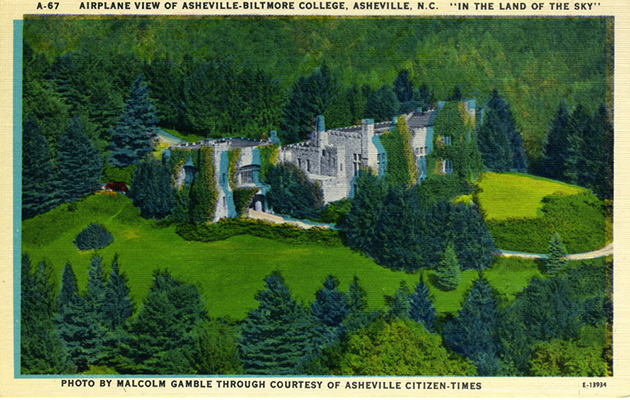Things I learned this week:
- The archives at my school has a really cool cook book collection.
- They don’t keep records of Buncombe County Schools.
- We’re all scared of something.
This week I interviewed the archivist in charge of UNCA’s Special Collections, Gene Hyde. During this meeting we discussed what the archives are, what they have, and how to use them.

Asheville-Biltmore College, the precursor to UNC Asheville, one of the photos that greets you when you walk in the door of special collections.
Unfortunately, our school archives do not have information on the Public School System for our county. Fortunately, he knew where we could most probably find some of the records that might be useful for us. He told me that we could probably find some information on various times Bluest Eye was challenged, and possibly the specific case we’re looking into at the the Buncombe County Public Library. My partner Cara Forbes will be conducting that interview soon, so more on that later.
I also got to hear about censorship from a librarian’s perspective. We discussed the literary value of offending readers, to which he said:
“I think that literature should challenge your assumptions, I think at times literature can upset you, because literature reflects the larger human existence which isn’t always pretty.” – Gene Hyde
Reading this doesn’t do justice to his vocal inflection. Hearing him say “pretty” made me think of a young girl picking flowers in a green field, unaware of the dark world around her. His voice seemed to mention the way parents hope to keep their children innocent and unaware of the possible horrors of the world. In one word he explained the motivation of the parents that challenge books.
Though I did not realize this when I interviewed him, as I transcribed his words I realized just how poorly the sentence on my screen reflected what he really meant.
We, as people, have a tendency to reject change. This coupled with the protectiveness of a parent leads to a response that, on the outside seems overly controlling and conservative. Then, what he said next made me understand why it might be a necessary response.
He told me about a book challenge from when he was on a committee that listened to and worked with book challenges at the Montgomery Floyd Regional Library system in Redford, Virginia. A book that was in the children’s section of the library was challenged for sexually explicit content. Though the committee did not believe the book was to explicit to be in circulation, they agreed that it may be better suited in a young adult section. At first this seemed unfair, why can’t other children read this book just because one parent didn’t approve? They still could though, he described this book at the cusp of the two ranges, so children for which that book was designed would likely also be going back and forth between sections.
During this interview, realized that the instinctual reaction to brush off people who wish to censor books is founded in a similar fear as those who challenge books. People challenge books because they don’t want to think about the implications of the text. Do we dismiss book challenges because we don’t want to discuss the capacities or library locations the book might be better suited for. Are we all just operating under maxims that don’t consider individual cases? Censorship is never Okay. Sexually explicit content is bad for children.
Leave a Reply